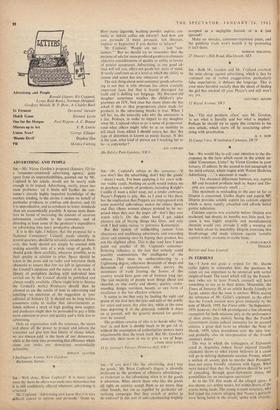done, Brian Copland! It is Many years since the thesis
he offers was made into mincemeat but it is still confidently ofiered whenever .advertising is criticised.
Mr. Copland: 'Advertising men know that it is very difficult 'indeed to inform and persuade.' Quite so.
lipw many cigarette, washing powder, aspirin, cos- metic or instant coffee ads inform? And how can you persuade (I mean persuade, not threaten, implore or hypnotise) if you decline to inform?
Mr. Copland: 'People are not . . . just "con- sumers."' But we should try to remember that the purpose of ads for mass-produced goods is to eliminate objective considerations of quality or utility in favour of passive acceptance. Advertising, as any good ad- man will tell you, offers not goods but states of mind. It rarely confronts us at a level at which the ability to. reason and select has any relevance at all.
The sick thing about most consumer goods advertis- ing is not that it tells obvious, lies about crucially important facts. but that it breeds disrespect for truth and is defiling our language. My five-year-old daughter sometimes watches the children's pro- grammes on ITV. Not once but many times she has asked if this or that preposterous claim made for products in the advertising breaks is true. When I tell her; no, she naturally asks why the announcer is a liar. Perhaps, in order to impart to my daughter what Mr. Copland refers to as 'a sense of proportion' (and what others might refer to as an inability to tell -black from white) I should assure her that this type of distortion is known as poetic licence. If this is the case, what kind of persOn am I teaching her to be—a copywriter?
10a Bei.size Park Gardens, NW3
K ii COPPARD






































 Previous page
Previous page